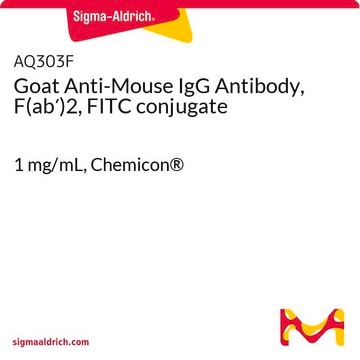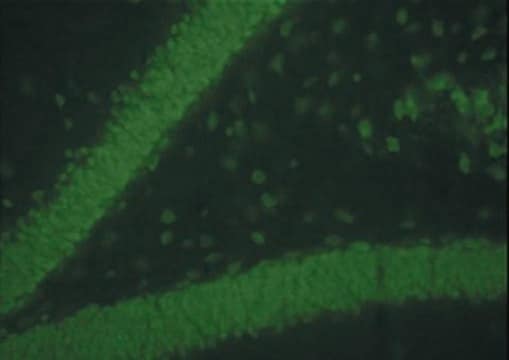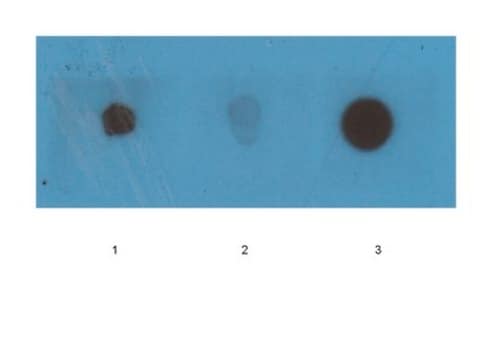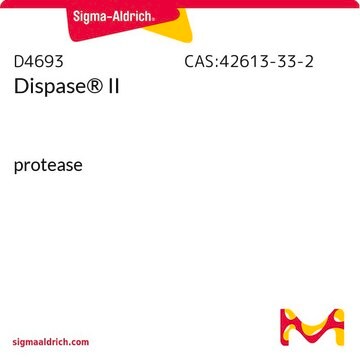AQ112F
Goat Anti-Human IgG Antibody, F(ab′)2, FITC conjugate
Chemicon®, from goat
Sign Into View Organizational & Contract Pricing
All Photos(1)
About This Item
UNSPSC Code:
12352203
eCl@ss:
32160702
NACRES:
NA.46
Recommended Products
biological source
goat
Quality Level
conjugate
FITC conjugate
antibody form
F(ab′)2 fragment of affinity isolated antibody
antibody product type
secondary antibodies
clone
polyclonal
species reactivity
human
manufacturer/tradename
Chemicon®
technique(s)
immunofluorescence: suitable
shipped in
wet ice
target post-translational modification
unmodified
Related Categories
Specificity
Based on immunoelectrophoresis, the antibody reacts with the heavy chains on human IgG and with light chains common to most human immunoglobulins. No antibody was detected against non-immunoglobulin serum proteins, but the antibody may cross-react with immunoglobulins from other species.
Immunogen
purified human IgG
Application
Immunohistochemistry: 1:500-1:5000
EIA and Western blots: 1:5000-1:100,000
Optimal working dilutions must be determined by end user.
EIA and Western blots: 1:5000-1:100,000
Optimal working dilutions must be determined by end user.
Research Category
Secondary & Control Antibodies
Secondary & Control Antibodies
Research Sub Category
Fragment Specific Secondary Antibodies
Fragment Specific Secondary Antibodies
This Goat anti-Human IgG Antibody, F(ab′)2, FITC conjugate is validated for use in IF for the detection of Human IgG.
Linkage
Replaces: AQ316F
Physical form
Affinity purified antibody. Lyophilized. Buffer = 0.01 M Sodium Phosphate, 0.25 M NaCl, pH 7.6 with 15mg/mL BSA, 0.01% thimerosal and 0.05% Sodium Azide
Storage and Stability
Reconstitution: Store freeze-dried product at 4°C until opened for up to 12 months. After opening, restore to 0.8 mL with distilled water to yield 1.4 mg/mL antibody concentration. Centrifuge product if it is not completely clear after standing for 1-2 hours at room temperature. (To judge clarity, draw product into a pasteur pipette). Product is stable for several weeks at 4°C as an undiluted liquid. Discard dilutions after more than one day. For extended storage after reconsitutiton, add an equal volume of glycerol to make a final concentation of 50% glycerol and store at -20°C. Please remember that the concentration of protein (and buffer salts) will decrease to one-half of the original after addition of glycerol.
Legal Information
CHEMICON is a registered trademark of Merck KGaA, Darmstadt, Germany
Disclaimer
Unless otherwise stated in our catalog or other company documentation accompanying the product(s), our products are intended for research use only and are not to be used for any other purpose, which includes but is not limited to, unauthorized commercial uses, in vitro diagnostic uses, ex vivo or in vivo therapeutic uses or any type of consumption or application to humans or animals.
Not finding the right product?
Try our Product Selector Tool.
Hazard Statements
Precautionary Statements
Hazard Classifications
Aquatic Chronic 3
Storage Class Code
11 - Combustible Solids
WGK
WGK 3
Certificates of Analysis (COA)
Search for Certificates of Analysis (COA) by entering the products Lot/Batch Number. Lot and Batch Numbers can be found on a product’s label following the words ‘Lot’ or ‘Batch’.
Already Own This Product?
Find documentation for the products that you have recently purchased in the Document Library.
Yinglan Guo et al.
Science advances, 9(47), eadj2641-eadj2641 (2023-11-24)
Staphylococcus epidermidis expresses glycerol phosphate wall teichoic acid (WTA), but some health care-associated methicillin-resistant S. epidermidis (HA-MRSE) clones produce a second, ribitol phosphate (RboP) WTA, resembling that of the aggressive pathogen Staphylococcus aureus. RboP-WTA promotes HA-MRSE persistence and virulence in
Our team of scientists has experience in all areas of research including Life Science, Material Science, Chemical Synthesis, Chromatography, Analytical and many others.
Contact Technical Service








